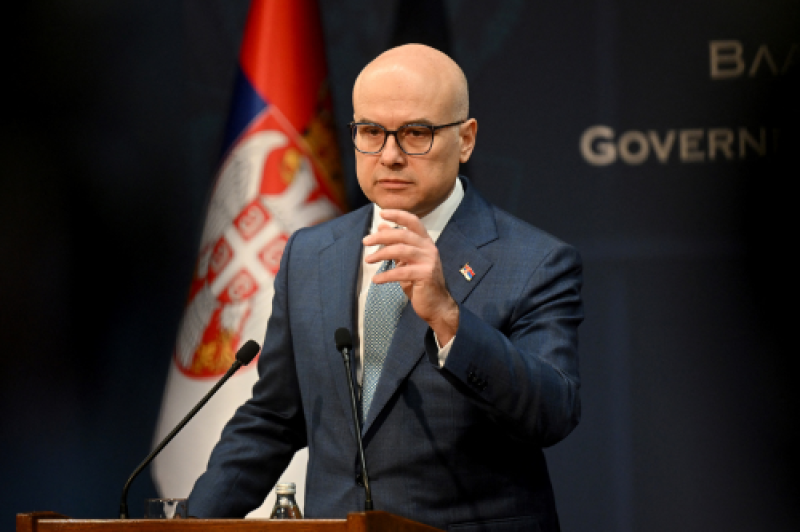- Irregularities, injustice will no longer be accepted in politics: Jamaat Ameer |
- 2 arrested in Jhenaidah for allegedly selling madrasa student |
- Koko’s wife campaigns for Tarique in Dhaka-17 |
- Bangladeshi Expats Cast 4.58 Lakh Postal Votes |
- IMF Forecasts Bangladesh GDP to Rebound to 4.7% in FY26 |
Serbia's call for transparency and oversight

Serbian Prime Minister holds a press conference announcing his resignation. Photo- Oliver Bunic-AFP via Transparency International
On Tuesday, Serbian Prime Minister Miloš Vučević resigned in a bid to ease political tensions following nearly three months of massive anti-corruption protests. Demonstrations erupted following the collapse of a train station canopy in Novi Sad in November 2024, which resulted in 15 deaths and two severely injured.
The tragedy has brought allegations of corruption and negligence into clear view, particularly in government contracting and the management of infrastructure projects. According to statements from government officials, around €16 million was spent on the station's renovation, nearly five times the initial €3.5 million estimate provided by the company which designed the project. So far, no explanations have been given for this discrepancy.
Here's the catch: The main contractor for the project was appointed without a tender, relying solely on direct contracting. The lack of competition and transparency in the selection of subcontractors raises concerns about inflated prices and potential corruption. The government insists it has released all relevant documentation, but Transparency Serbia has criticised the withholding of key financial data from the public, including the price table showing how much the government committed to pay for the renovation and why it was considered reasonable.
After several protests in Novi Sad and Belgrade, students from across the country took the lead, backed by widespread public support, demanding the publication of all documents related to the construction. Instead of addressing these demands, protesters faced retaliation, including violent attacks, alleged harassment from the Security Intelligence Agency and smear campaigns in state-controlled media.
The public prosecutor filed charges against 13 officials, including the former construction minister, with public safety violations and construction negligence. However, the investigation still ignores the deeper issue: corruption that many believe led to this tragedy.
As Transparency International highlighted in the 2023 Corruption Perception Index (CPI), Serbia struggles to prosecute and sanction public officials who abuse their position. The concentration of power and lack of institutional independence further weaken the country's anti-corruption efforts: oversight bodies, despite clear mandates are constrained to act – especially when high-ranking officials are involved.
We stand with Transparency Serbia in urging the government and the Ministry of Construction, Transport and Infrastructure to publish without further delay all relevant information on this case, as well as on all other projects not contracted under public procurement law. This information is crucial given that Serbia’s government infrastructure investment plans rely heavily on non-transparent and non-competitive procurements, with several billion euros spent annually. We also call for a judicial investigation of potential corruption and the prosecution of those responsible.
Institutions must prioritise civil society and the voices of protesters, acting on to their calls for accountability. This tragedy should be a wake-up call to prevent future disasters. Only by ensuring transparency and proper oversight in infrastructure projects can true accountability be restored. – Transparency International

